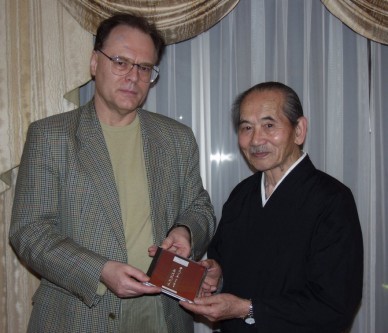 |
yoshinori fumon
Although born in Tokyo in 1911, Yoshinori Fumon was raised in Nara, near the Kansai region metropolises of Osaka and Kyoto. During his childhood and youth, the biwa was one of the most respected forms of musical entertainment in urban areas with some performers reaching a status of fame comparable to that of popular music artists today. The youngest member of his family, Fumon was exposed to this music from an early age. His mother taught him shigin [a style of recitation used in Satsumabiwa with poems in the Chinese style] while his brother, the futurist painter Fumon Gyu studied Satsumabiwa Kinshinryu [a new style of biwa music developed by Nagata Kinshin—undoubtedly the most popular performer of his time]. At 13 Fumon formally started taking lessons—first with Fujisawa Kyuko, a pupil of the teikotu-ha biwa player Toda Ryuko. By the time he was 17 he was studying seiha Satsumabiwa with Sugi Gakuho and Uchida Kojo, who had studied with the renowned Yoshimura Gakujo and the Kagoshima [Satsuma] player, Ijuin Kakujo, respectively. Three years later Uchida introduced Fumon to the famous teacher Sagara Shijo. Sagara taught Fumon the traditional theory and the Satsumabiwa shifu style of playing that had been practiced by the Shimazu clan samurai in the former feudal domain of Satsuma [present-day Kagoshima]. During this time, Fumon was very active as a performer and calligrapher. He was also a student participant in the Kasuga Shrine's gagaku orchestra in Nara, learning both gagaku theory and ryuteki. In order to study the relationship between Satsumabiwa and its predecessor mosobiwa [the biwa music practised by the blind monks mostly of Tendai sect affiliation in southern Japan] Fumon studied shomyo, meeting with the Tendai sect shomyo expert Taki Donin at Enryakuji temple of Mt. Hiezan. From 1933-35 Fumon further studied the shifu biwa style with the Kagoshima born Togo Shigeatsu, a pupil of the 19th century master Ban Hikoshiro. At the age of 25, Fumon ceased performing and instead devoted himself to teaching and research into the biwa's music and history. He entered into Kyoto's Ritsumei University in 1935, graduating in 1940. However, while studying, he continued to meet and perform in private with leading biwa teachers of the day, including Yoshimura Gakujo, Makino Kinko, and others. Upon graduating in 1940, he was immediately employed as a dockyard engineer and posted to the important port of Chintao, China. While there, he met the German scholar of medieval Japanese Dr. Margot Grzywacz, learning German from her. In 1944, Fumon was conscripted into the army and saw action in the Chinese interior. He returned to Japan in early 1946. Throughout the years following the war, he continued to teach while also holding temporary positions and jobs to rear and feed his family. In 1954, he received a position with the U.S. naval base at Yokosuka, in Kanagawa prefecture to the south of Tokyo. In 1972, he founded the Fumon Biwa Institute in Tokyo. He continues to give practical instruction and instruction for research students affiliated with universities in Tokyo to this day. He has held a number of teaching positions at various institutions including the Tokyo National University of Fine Arts [1967-1971] and the Takasaki College of Fine Arts and Music [1993-1999]. In 1982, he performed abroad for the first time in China. Since then he has traveled widely to promote international relations by demonstrating the biwa, visiting universities and music institutions in Austria, Germany, Great Britain, Hong Kong, Hungary, Ireland, Switzerland and the USA. His enthusiasm for presenting and teaching his art inter-culturally have enabled a number of non-Japanese student-researchers to work with him intensively since the early 1980s. Yoshinori Fumon is marrried with three sons, four grandchildren, and one great-grandchild. He has published a short book about the history and scale theory of Satsumabiwa—"satsumabiwa no yurai to oncho". Yoshinori Fumon suffered a stroke in February 2001 from which he never fully recovered; he passed away at Easter, April 2002.
Company President, Eckart Rahn, presents Yoshinori Fumon with his new CD Satsumabiwa: Japan's Noble Ballads (13207-2) .
|
|
|
 |
 Satsumabiwa: Japan's Noble Ballads (
Satsumabiwa: Japan's Noble Ballads ( Tokyo,
February 1, 2001
Tokyo,
February 1, 2001